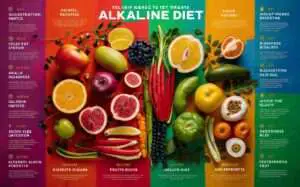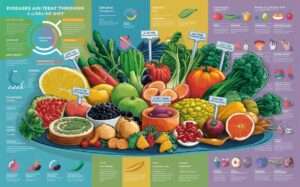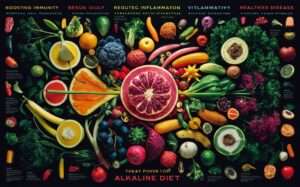How to Treat Various Diseases Through an Alkaline Diet?
The alkaline diet has gained popularity for its potential health benefits, ranging from better digestion to improved energy levels. This comprehensive guide explores how an alkaline diet can help treat various diseases and conditions, with a specific focus on different age groups and health issues.

Table of Contents
ToggleAlkaline Diet for Toddlers
Nutritional Needs of Toddlers
Toddlers require a balanced diet rich in nutrients to support their rapid growth and development. An alkaline diet, emphasizing fruits, vegetables, nuts, and seeds, can provide essential vitamins and minerals.
Benefits of an Alkaline Diet for Toddlers
- Improved Digestion: Alkaline foods can help maintain a healthy digestive system.
- Stronger Immunity: Nutrient-dense foods strengthen the immune system.
- Better Bone Health: Alkaline foods are rich in calcium and magnesium, essential for growing bones.
Sample Alkaline Diet Meal Plan for Toddlers
- Breakfast: Smoothie with spinach, banana, and almond milk.
- Lunch: Avocado and tomato salad with olive oil.
- Dinner: Quinoa with steamed broccoli and carrots.
- Snacks: Fresh fruits and nuts.
Alkaline Diet and Brain Fog
Causes of Brain Fog
Brain fog can be caused by various factors, including poor diet, stress, and lack of sleep.
How an Alkaline Diet Can Help?
- Nutrient-Rich Foods: Foods like leafy greens and nuts provide essential nutrients that support brain health.
- Hydration: Staying hydrated with alkaline water can improve cognitive function.
- Reduced Inflammation: An alkaline diet helps reduce inflammation, which can contribute to brain fog.
Sample Alkaline Diet Plan to Combat Brain Fog
- Breakfast: Kale and berry smoothie with chia seeds.
- Lunch: Spinach salad with walnuts, strawberries, and balsamic vinaigrette.
- Dinner: Grilled asparagus with quinoa and lemon.
- Snacks: Almonds and fresh berries.
Also Read more about “How Alkaline diet improve Anxiety, IBS, hormonal balance and much more?”
Alkaline Diet for Young Athletes
Nutritional Needs of Young Athletes
Young athletes need a diet that supports energy levels, muscle recovery, and overall performance.
Benefits of an Alkaline Diet for Young Athletes
- Enhanced Energy: Alkaline foods provide sustained energy.
- Improved Muscle Recovery: Anti-inflammatory foods help reduce muscle soreness.
- Better Hydration: Alkaline water helps maintain hydration.
Sample Alkaline Diet Meal Plan for Young Athletes
- Breakfast: Smoothie with spinach, banana, and almond butter.
- Lunch: Chickpea and vegetable wrap.
- Dinner: Lentil soup with mixed greens.
- Snacks: Fresh fruit and hummus with carrot sticks.
Also Read more about “Impact of Alkaline Diet on Fertility, Heart and Overall Health!”
Alkaline Diet and Immunity
Role of Diet in Immunity
A strong immune system is crucial for preventing illnesses and infections.
How an Alkaline Diet Boosts Immunity?
- Rich in Antioxidants: Foods like berries and nuts are high in antioxidants, which protect against cell damage.
- Vitamins and Minerals: Essential nutrients like vitamin C, zinc, and selenium found in alkaline foods support immune function.
- Anti-Inflammatory: Reducing inflammation helps the body fight off infections more effectively.
Sample Alkaline Diet Plan for Boosting Immunity
- Breakfast: Smoothie with kale, pineapple, and ginger.
- Lunch: Mixed greens salad with bell peppers, sunflower seeds, and lemon dressing.
- Dinner: Baked tofu with steamed vegetables.
- Snacks: Oranges and almonds.
Also Read more about “Alkaline Diet vs. Paleo Diet and Disease Prevention!”
Alkaline Diet for Fibromyalgia

Understanding Fibromyalgia
Fibromyalgia is a chronic condition characterized by widespread pain, fatigue, and other symptoms.
Benefits of an Alkaline Diet for Fibromyalgia
- Pain Reduction: Anti-inflammatory foods can help reduce pain and discomfort.
- Increased Energy: Nutrient-rich foods help combat fatigue.
- Better Sleep: Alkaline foods can improve sleep quality, which is often disrupted in fibromyalgia.
Sample Alkaline Diet Plan for Fibromyalgia
- Breakfast: Smoothie with spinach, banana, and flax seeds.
- Lunch: Quinoa salad with cucumber, tomatoes, and olive oil.
- Dinner: Stir-fried vegetables with tofu.
- Snacks: Fresh fruit and mixed nuts.
Also Read more about “Health Benefits of Alkaline Diet along with Breakfast and Smoothies Ideas!”
Alkaline Diet and Candida
Understanding Candida Overgrowth
Candida overgrowth can lead to various health issues, including digestive problems and infections.
How an Alkaline Diet Helps Control Candida?
- Low Sugar Intake: Alkaline foods are low in sugar, which helps control candida growth.
- Rich in Antifungal Compounds: Foods like garlic and coconut oil have antifungal properties.
- Supporting Gut Health: An alkaline diet promotes a healthy gut microbiome, which helps control candida.
Sample Alkaline Diet Plan for Candida
- Breakfast: Smoothie with kale, avocado, and coconut milk.
- Lunch: Salad with mixed greens, garlic, and olive oil.
- Dinner: Grilled vegetables with quinoa.
- Snacks: Fresh berries and pumpkin seeds.
Also Read more about “How to Kickstart Your Health with the Alkaline Diet?”
Alkaline Diet for Chronic Illness
Managing Chronic Illness with Diet
Chronic illnesses, such as diabetes and heart disease, require long-term dietary management.
Benefits of an Alkaline Diet for Chronic Illness
- Improved Nutrient Intake: Alkaline foods provide essential nutrients that support overall health.
- Reduced Inflammation: Anti-inflammatory foods help manage symptoms of chronic illnesses.
- Better Blood Sugar Control: Low glycemic index foods help maintain stable blood sugar levels.
Sample Alkaline Diet Plan for Chronic Illness
- Breakfast: Smoothie with spinach, banana, and almond butter.
- Lunch: Chickpea salad with mixed greens and lemon dressing.
- Dinner: Lentil soup with vegetables.
- Snacks: Fresh fruit and nuts.
Also Read more about “What Is the Alkaline Diet and Its Effects on the Body?”
Alkaline Diet and Migraines
Causes of Migraines
Migraines can be triggered by various factors, including diet, stress, and hormonal changes.
How an Alkaline Diet Can Help?
- Reduced Triggers: Avoiding certain foods, such as processed foods and dairy, can help reduce migraine triggers.
- Anti-Inflammatory Foods: Alkaline foods help reduce inflammation, which can contribute to migraines.
- Improved Hydration: Staying hydrated with alkaline water can help prevent migraines.
Sample Alkaline Diet Plan for Migraines
- Breakfast: Smoothie with spinach, banana, and ginger.
- Lunch: Mixed greens salad with avocado, tomatoes, and olive oil.
- Dinner: Grilled vegetables with quinoa.
- Snacks: Fresh fruit and nuts.
Also Read more about “How to Treat Various Diseases Through an Alkaline Diet?”
Alkaline Diet and Chronic Stress
Understanding Chronic Stress
Chronic stress can negatively impact overall health and well-being.
Benefits of an Alkaline Diet for Chronic Stress
- Nutrient-Dense Foods: Foods rich in vitamins and minerals support the body’s ability to manage stress.
- Anti-Inflammatory Properties: Reducing inflammation helps the body cope with stress.
- Improved Mood: Nutrient-rich foods can improve mood and mental health.
Sample Alkaline Diet Plan for Chronic Stress
- Breakfast: Smoothie with kale, banana, and chia seeds.
- Lunch: Spinach salad with walnuts, strawberries, and balsamic vinaigrette.
- Dinner: Baked tofu with steamed broccoli and brown rice.
- Snacks: Fresh fruit and almonds.
Alkaline Diet and Longevity
Role of Diet in Longevity
A healthy diet is crucial for promoting longevity and reducing the risk of age-related diseases.
How an Alkaline Diet Promotes Longevity?
- Nutrient-Rich Foods: Alkaline foods provide essential vitamins and minerals that support overall health.
- Reduced Inflammation: Anti-inflammatory foods help prevent chronic diseases.
- Improved Cellular Health: Alkaline foods support healthy cell function and repair.
Sample Alkaline Diet Plan for Longevity
- Breakfast: Smoothie with spinach, banana, and almond milk.
- Lunch: Mixed greens salad with chickpeas, avocado, and olive oil.
- Dinner: Lentil soup with vegetables.
- Snacks: Fresh fruit and nuts.
Alkaline Diet and Environmental Impact
Understanding the Environmental Impact of Diet
The production and consumption of food have significant environmental impacts, including greenhouse gas emissions and resource use.
How an Alkaline Diet is Environmentally Friendly?
- Plant-Based Foods: Alkaline diets emphasize plant-based foods, which have a lower environmental impact compared to animal products.
- Sustainable Practices: Emphasizing local and organic produce reduces the environmental impact of food production.
- Reduced Waste: A focus on whole, unprocessed foods help reduce packaging waste.
Sample Alkaline Diet Plan with Environmental Considerations
- Breakfast: Smoothie with kale, banana, and locally sourced almond milk.
- Lunch: Spinach salad with seasonal vegetables and olive oil.
- Dinner: Stir-fried vegetables with tofu and brown rice.
- Snacks: Fresh fruit and nuts.
Alkaline Diet and Sustainability
Importance of Sustainable Eating
Sustainable eating practices are crucial for preserving the environment and ensuring food security.
How an Alkaline Diet Supports Sustainability?
- Plant-Based Emphasis: Alkaline diets focus on plant-based foods, which are more sustainable.
- Local and Organic Produce: Emphasizing local and organic produce supports sustainable farming practices.
- Reduced Resource Use: Plant-based foods typically require fewer resources to produce compared to animal products.
Sample Alkaline Diet Plan for Sustainability
- Breakfast: Smoothie with locally sourced kale, banana, and almond milk.
- Lunch: Mixed greens salad with seasonal vegetables and olive oil.
- Dinner: Grilled vegetables with quinoa and a side of locally sourced beans.
- Snacks: Fresh fruit and nuts.
Alkaline Diet and Vitality
Role of Diet in Vitality
A diet rich in nutrients supports overall energy levels and vitality.
How an Alkaline Diet Enhances Vitality?
- Nutrient-Dense Foods: Alkaline foods provide essential vitamins and minerals that boost energy levels.
- Improved Digestion: Alkaline foods support a healthy digestive system, which is crucial for nutrient absorption and energy production.
- Hydration: Staying hydrated with alkaline water helps maintain energy levels.
Sample Alkaline Diet Plan for Vitality
- Breakfast: Smoothie with spinach, banana, and almond butter.
- Lunch: Chickpea salad with mixed greens and lemon dressing.
- Dinner: Lentil soup with vegetables.
- Snacks: Fresh fruit and nuts.
Alkaline Diet for Prediabetes
Understanding Prediabetes
Prediabetes is a condition where blood sugar levels are higher than normal but not yet high enough to be classified as diabetes.

How an Alkaline Diet Can Help Manage Prediabetes?
- Low Glycemic Index Foods: Alkaline foods have a low glycemic index, helping to maintain stable blood sugar levels.
- Rich in Fiber: High-fiber foods help regulate blood sugar levels.
- Nutrient-Dense: Alkaline foods provide essential nutrients that support overall health.
Sample Alkaline Diet Plan for Prediabetes
- Breakfast: Smoothie with kale, banana, and chia seeds.
- Lunch: Spinach salad with chickpeas, avocado, and lemon dressing.
- Dinner: Baked tofu with steamed vegetables.
- Snacks: Fresh fruit and nuts.
Alkaline Diet for Metabolic Syndrome
Understanding Metabolic Syndrome
Metabolic syndrome is a cluster of conditions that increase the risk of heart disease, stroke, and diabetes.
Benefits of an Alkaline Diet for Metabolic Syndrome?
- Improved Nutrient Intake: Alkaline foods provide essential nutrients that support overall health.
- Reduced Inflammation: Anti-inflammatory foods help manage symptoms of metabolic syndrome.
- Better Blood Sugar Control: Low glycemic index foods help maintain stable blood sugar levels.
Sample Alkaline Diet Plan for Metabolic Syndrome
- Breakfast: Smoothie with spinach, banana, and flax seeds.
- Lunch: Quinoa salad with cucumber, tomatoes, and olive oil.
- Dinner: Stir-fried vegetables with tofu.
- Snacks: Fresh fruit and mixed nuts.
Alkaline Diet and Epilepsy
Understanding Epilepsy
Epilepsy is a neurological disorder characterized by recurrent seizures.
How an Alkaline Diet Can Help Manage Epilepsy?
- Anti-Inflammatory Foods: Reducing inflammation can help manage symptoms of epilepsy.
- Nutrient-Dense Foods: Essential vitamins and minerals support overall brain health.
- Improved Digestion: A healthy digestive system supports overall health and well-being.
Sample Alkaline Diet Plan for Epilepsy
- Breakfast: Smoothie with kale, avocado, and coconut milk.
- Lunch: Salad with mixed greens, garlic, and olive oil.
- Dinner: Grilled vegetables with quinoa.
- Snacks: Fresh berries and pumpkin seeds.
Alkaline Diet for Chronic Diseases
Managing Chronic Diseases with Diet
Chronic diseases, such as diabetes and heart disease, require long-term dietary management.

Benefits of an Alkaline Diet for Chronic Diseases
- Improved Nutrient Intake: Alkaline foods provide essential nutrients that support overall health.
- Reduced Inflammation: Anti-inflammatory foods help manage symptoms of chronic diseases.
- Better Blood Sugar Control: Low glycemic index foods help maintain stable blood sugar levels.
Sample Alkaline Diet Plan for Chronic Diseases
- Breakfast: Smoothie with spinach, banana, and almond butter.
- Lunch: Chickpea salad with mixed greens and lemon dressing.
- Dinner: Lentil soup with vegetables.
- Snacks: Fresh fruit and nuts.
Alkaline Diet and Veganism
Understanding Veganism
Veganism is a diet and lifestyle that excludes all animal products.
How an Alkaline Diet Supports Veganism?
- Plant-Based Foods: An alkaline diet emphasizes plant-based foods, making it compatible with veganism.
- Nutrient-Dense: Alkaline foods provide essential vitamins and minerals that support overall health.
- Reduced Inflammation: Anti-inflammatory foods help manage symptoms of chronic diseases.
Sample Alkaline Vegan Diet Plan
- Breakfast: Smoothie with kale, banana, and almond milk.
- Lunch: Mixed greens salad with chickpeas, avocado, and olive oil.
- Dinner: Lentil soup with vegetables.
- Snacks: Fresh fruit and nuts.
Alkaline Diet and Vegetarianism
Understanding Vegetarianism
Vegetarianism is a diet that excludes meat and sometimes other animal products.

How an Alkaline Diet Supports Vegetarianism?
- Plant-Based Emphasis: An alkaline diet emphasizes plant-based foods, making it compatible with vegetarianism.
- Nutrient-Dense: Alkaline foods provide essential vitamins and minerals that support overall health.
- Reduced Inflammation: Anti-inflammatory foods help manage symptoms of chronic diseases.
Sample Alkaline Vegetarian Diet Plan
- Breakfast: Smoothie with spinach, banana, and almond milk.
- Lunch: Mixed greens salad with chickpeas, avocado, and olive oil.
- Dinner: Lentil soup with vegetables.
- Snacks: Fresh fruit and nuts.
Alkaline Diet for Nursing Mothers
Nutritional Needs of Nursing Mothers
Nursing mothers require a diet rich in nutrients to support milk production and overall health.
Benefits of an Alkaline Diet for Nursing Mothers
- Nutrient-Dense Foods: Alkaline foods provide essential vitamins and minerals that support milk production.
- Improved Digestion: Alkaline foods support a healthy digestive system, which is crucial for nutrient absorption.
- Hydration: Staying hydrated with alkaline water helps maintain energy levels.
Sample Alkaline Diet Plan for Nursing Mothers
- Breakfast: Smoothie with spinach, banana, and almond butter.
- Lunch: Chickpea salad with mixed greens and lemon dressing.
- Dinner: Lentil soup with vegetables.
- Snacks: Fresh fruit and nuts.
Alkaline Diet for Better Mood
Role of Diet in Mood
A healthy diet is crucial for maintaining a stable mood and overall mental health.
How an Alkaline Diet Can Improve Mood?
- Nutrient-Dense Foods: Alkaline foods provide essential vitamins and minerals that support brain health.
- Anti-Inflammatory Properties: Reducing inflammation helps manage symptoms of depression and anxiety.
- Improved Digestion: A healthy digestive system supports overall health and well-being.
Sample Alkaline Diet Plan for Better Mood
- Breakfast: Smoothie with kale, banana, and chia seeds.
- Lunch: Spinach salad with walnuts, strawberries, and balsamic vinaigrette.
- Dinner: Baked tofu with steamed broccoli and brown rice.
- Snacks: Fresh fruit and almonds.
Alkaline Diet for Muscle Recovery
Importance of Muscle Recovery
Muscle recovery is crucial for athletes and individuals who engage in regular physical activity.
How an Alkaline Diet Supports Muscle Recovery?
- Anti-Inflammatory Foods: Reducing inflammation helps reduce muscle soreness and improve recovery time.
- Nutrient-Dense Foods: Alkaline foods provide essential vitamins and minerals that support muscle repair and growth.
- Hydration: Staying hydrated with alkaline water helps maintain energy levels and support muscle function.
Sample Alkaline Diet Plan for Muscle Recovery
- Breakfast: Smoothie with spinach, banana, and almond butter.
- Lunch: Chickpea salad with mixed greens and lemon dressing.
- Dinner: Lentil soup with vegetables.
- Snacks: Fresh fruit and nuts.
Alkaline Diet and Skin Conditions
Understanding Skin Conditions
Skin conditions, such as acne, eczema, and psoriasis, can be influenced by diet and lifestyle factors.
Benefits of an Alkaline Diet for Skin Conditions
- Anti-Inflammatory Foods: Reducing inflammation helps manage symptoms of skin conditions.
- Nutrient-Dense Foods: Alkaline foods provide essential vitamins and minerals that support skin health.
- Improved Digestion: A healthy digestive system supports overall health and well-being.
Sample Alkaline Diet Plan for Skin Conditions
- Breakfast: Smoothie with kale, avocado, and coconut milk.
- Lunch: Salad with mixed greens, garlic, and olive oil.
- Dinner: Grilled vegetables with quinoa.
- Snacks: Fresh berries and pumpkin seeds.
Alkaline Diet for Children
Nutritional Needs of Children
Children require a balanced diet rich in nutrients to support their rapid growth and development.
Benefits of an Alkaline Diet for Children
- Improved Digestion: Alkaline foods can help maintain a healthy digestive system.
- Stronger Immunity: Nutrient-dense foods strengthen the immune system.
- Better Bone Health: Alkaline foods are rich in calcium and magnesium, essential for growing bones.
Sample Alkaline Diet Meal Plan for Children
- Breakfast: Smoothie with spinach, banana, and almond milk.
- Lunch: Avocado and tomato salad with olive oil.
- Dinner: Quinoa with steamed broccoli and carrots.
- Snacks: Fresh fruits and nuts.
Alkaline Diet for Elderly Health
Nutritional Needs of the Elderly
Elderly individuals require a diet rich in nutrients to support overall health and well-being.
Benefits of an Alkaline Diet for Elderly Health
- Improved Digestion: Alkaline foods support a healthy digestive system.
- Stronger Immunity: Nutrient-dense foods strengthen the immune system.
- Better Bone Health: Alkaline foods are rich in calcium and magnesium, essential for maintaining bone health.
Sample Alkaline Diet Meal Plan for the Elderly
- Breakfast: Smoothie with spinach, banana, and almond milk.
- Lunch: Avocado and tomato salad with olive oil.
- Dinner: Quinoa with steamed broccoli and carrots.
- Snacks: Fresh fruits and nuts.
Alkaline Diet and Cancer Support
Role of Diet in Cancer Support
A healthy diet is crucial for supporting overall health and well-being during cancer treatment.
How an Alkaline Diet Can Support Cancer Patients?
- Anti-Inflammatory Foods: Reducing inflammation helps manage symptoms and side effects of cancer treatment.
- Nutrient-Dense Foods: Alkaline foods provide essential vitamins and minerals that support overall health.
- Improved Digestion: A healthy digestive system supports overall health and well-being.
Sample Alkaline Diet Plan for Cancer Support
- Breakfast: Smoothie with kale, banana, and chia seeds.
- Lunch: Spinach salad with walnuts, strawberries, and balsamic vinaigrette.
- Dinner: Baked tofu with steamed broccoli and brown rice.
- Snacks: Fresh fruit and almonds.
Alkaline Diet and Microbiome
Understanding the Microbiome
The microbiome is the community of microorganisms that live in the digestive tract and play a crucial role in overall health.
How an Alkaline Diet Supports a Healthy Microbiome?
- Rich in Fiber: Alkaline foods are high in fiber, which supports a healthy gut microbiome.
- Low in Sugar: Reducing sugar intake helps maintain a balanced microbiome.
- Probiotic-Rich Foods: Foods like fermented vegetables support the growth of healthy gut bacteria.
Sample Alkaline Diet Plan for a Healthy Microbiome
- Breakfast: Smoothie with kale, banana, and flax seeds.
- Lunch: Quinoa salad with cucumber, tomatoes, and olive oil.
- Dinner: Stir-fried vegetables with tofu.
- Snacks: Fresh berries and pumpkin seeds.
Alkaline Diet and Liver Detox
Importance of Liver Health
The liver plays a crucial role in detoxification and overall health.
How an Alkaline Diet Supports Liver Detox?
- Rich in Antioxidants: Foods like berries and nuts are high in antioxidants, which protect the liver.
- Low in Toxins: Alkaline foods are free from harmful chemicals and additives that can burden the liver.
- Supporting Detoxification: Foods like garlic and cruciferous vegetables support the liver’s detoxification processes.
Sample Alkaline Diet Plan for Liver Detox
- Breakfast: Smoothie with kale, avocado, and coconut milk.
- Lunch: Salad with mixed greens, garlic, and olive oil.
- Dinner: Grilled vegetables with quinoa.
- Snacks: Fresh berries and pumpkin seeds.
Alkaline Diet and Kidney Stones
Understanding Kidney Stones
Kidney stones are hard deposits of minerals that form in the kidneys and can cause severe pain.
How an Alkaline Diet Can Help Prevent Kidney Stones?
- Low in Oxalates: Alkaline foods are low in oxalates, which can contribute to kidney stones.
- Rich in Citrates: Foods like citrus fruits can help prevent the formation of kidney stones.
- Improved Hydration: Staying hydrated with alkaline water helps prevent kidney stones.
Sample Alkaline Diet Plan for Kidney Stone Prevention
- Breakfast: Smoothie with spinach, banana, and almond milk.
- Lunch: Mixed greens salad with avocado, tomatoes, and olive oil.
- Dinner: Grilled vegetables with quinoa.
- Snacks: Fresh fruit and nuts.
Conclusion:
An alkaline diet can provide numerous health benefits, ranging from improved digestion and immune function to better mental health and chronic disease management. By focusing on nutrient-dense, plant-based foods and staying hydrated with alkaline water, individuals can support their overall health and well-being.
Whether you’re a young athlete, a nursing mother, or dealing with chronic illness, an alkaline diet can help you achieve optimal health and vitality.
FREQUENTLY ASKED QUESTIONS
1. How can an alkaline diet help treat diseases?
An alkaline diet is believed to help treat diseases by reducing inflammation in the body. By consuming foods that are considered alkaline, such as fruits and vegetables, it helps to balance the body’s pH levels and create a more alkaline environment.
This can help to neutralize acids in the body that may be contributing to disease processes. Additionally, an alkaline diet is typically rich in vitamins, minerals, and antioxidants, which are essential for supporting the immune system and overall health. Studies have shown that this type of diet may be beneficial for conditions such as rheumatoid arthritis, osteoporosis, and kidney stones.
While more research is needed to fully understand the potential benefits of an alkaline diet for disease treatment, incorporating alkaline foods into one’s diet may be a helpful adjunct therapy in promoting wellness and preventing certain health conditions.
2. What are some common diseases that can be treated through an alkaline diet?
An alkaline diet has been associated with improving symptoms and reducing the risk of various common diseases. Some of the most notable conditions that can be treated through an alkaline diet include acid reflux, osteoporosis, and kidney stones. Acid reflux occurs when there is excess stomach acid, leading to heartburn and discomfort.
Alkaline foods help neutralize this acidity, providing relief for those suffering from this condition. Osteoporosis, a condition characterized by weakened bones, can benefit from an alkaline diet as it helps maintain bone density levels by promoting the growth of bone-forming cells.
Lastly, kidney stones form due to an accumulation of certain minerals in the kidneys, which can be prevented or treated through an alkaline diet that discourages the formation of these minerals.
By incorporating more alkaline-rich foods such as fruits, vegetables, nuts, and seeds into one’s diet, individuals may experience improvements in these conditions and overall health.
3. Are there certain foods that should be avoided on an alkaline diet?
When following an alkaline diet, it is recommended to avoid certain foods that can increase acidity in the body. High-acid foods such as red meat, processed meats, dairy products, refined sugars, and alcohol should be limited or eliminated from the diet. These foods can contribute to inflammation and disrupt the body’s pH balance, leading to lower energy levels and increased risk of chronic diseases.
Additionally, caffeine and artificial sweeteners should be avoided as they can also impact the body’s acid-alkaline balance. Instead, focus on consuming alkaline-rich foods such as fruits, vegetables, legumes, nuts, and seeds to promote optimal health and well-being.
By making mindful choices and incorporating more alkalizing foods into your diet, you can support a more balanced pH level in your body and potentially improve overall health outcomes.
4. How long does it take to see results from following an alkaline diet for disease treatment?
It typically takes anywhere from one to three months to see noticeable results from following an alkaline diet for disease treatment. The alkaline diet focuses on consuming foods that are low in acidic content and high in alkaline-promoting nutrients such as fruits, vegetables, whole grains, and nuts.
By reducing acidity in the body through this dietary approach, individuals may experience improvements in symptoms related to chronic diseases such as arthritis, diabetes, and cardiovascular issues.
However, the timeframe for experiencing results can vary depending on factors such as the severity of the disease, overall health status of the individual, adherence to the diet plan, and other lifestyle habits.
Consistency is key when following an alkaline diet for disease treatment, and consulting with a healthcare professional or registered dietitian can help tailor a personalized plan for optimal results.


